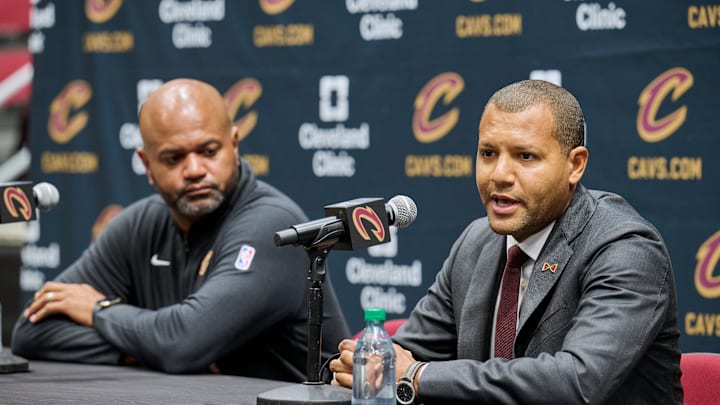Cleveland Cavaliers head coach, J.B Bickerstaff was let go on Thursday morning after four full seasons in the position. The Cavs offense struggled to find its identity and gain momentum in the postseason, and Bickerstaff is paying the price. In his four years, Bickerstaff improved year by year, taking the Cavs from the lottery to the Play-In Tournament before two consecutive trips to the playoffs with the fourth seed in the Eastern Conference.
However, should it actually be Cavaliers general manager, Koby Altman facing the backlash, or do they share the blame? Was this just a result of an injury-riddled season, and the Cavaliers would be wise to "run it back" with Koby as general manager. Let's take a closer look at Altman's seven-year tenure with the Cavaliers.
The Early Years of the Koby Era
Koby became the Cavaliers general manager in the summer of 2017, one of the most crucial times in Cavalier history. LeBron James was entering his contract year with the Cavs, and Kyrie Irving requested a trade in hopes of leading his own team. Altman's first big move was shipping Irving to Eastern Conference foe Boston Celtics for an injured Isaiah Thomas, Jae Crowder, Ante Zizic and an unprotected 2018 first round pick (through the Brooklyn Nets). Thomas was coming off a career year and Second Team All-NBA appearance before a devastating hip injury, Crowder's stock was at an all-time high, and those players combined with an unprotected first rounder - it looked like Koby had gotten the best return he could for the disgruntled Irving.
At the time, the trade was mostly praised by fans and media, but it would turn quickly. Isaiah Thomas was never the same player again, struggling to find his quickness after the injuries and was an NBA journeyman after his short stint with the Cavs. Ahead of the trade, Cleveland knew Thomas could not pass the physical test but chose to follow through with the deal. Additionally, Crowder didn't look the same playing in a LeBron James led offense and would bounce around the league after his time in Cleveland.
It may be unfair to criticize after the fact, but Altman and the Cavaliers could have done more research into Thomas' injury or take a harder stance with the Celtics to receive more in return for taking a severely-injured player. The Cavs should have put more thought into bringing in a 28-year-old 5-foot 9-inches point guard who was not capable of playing NBA basketball. With LeBron coming to free agency, a mismanaged trade was unacceptable.
The history of small guards having injuries at that age is not a good track record of success. Ultimately, Altman definitely gets a pass for this trade. It was his first big deal, and the trade was mostly praised at the time.
